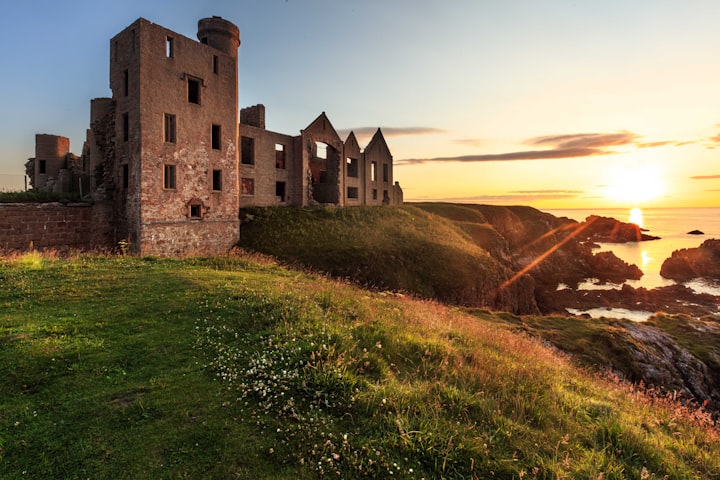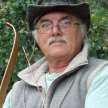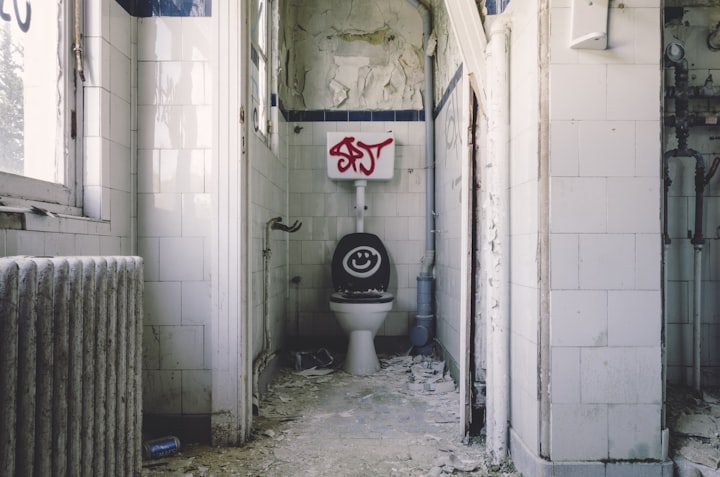The Severed Knot
Following a hunch doesn't always work out

Those who knew a thing or two about the English Civil War acknowledged that the Battle of Blundell's Edge was a turning point for the Parliamentarians. What was not suspected was that the previous night of Royalist debauchery at nearby Higley Court was a contributing factor. Higley Court had burned down immediately afterwards so the world didn’t know the truth. Only Gerald Higgs did. Or thought he did …but had made it his life's work to find out.
His obsession could be traced to two unique events from College days, when research for a thesis had thrown up a misfiled dispatch from the Royalist battle lines revealing some startling information: and the resultant, and only, intuitive thought that had ever crossed his mind in an otherwise unillustrious academic career. Unfortunately, before he had completed his notes, the dispatch had promptly been misfiled again so comprehensively that the information might never have been glimpsed at all.
There was precious little to go on, therefore, but what there was had brought him at last to the ruins of the former Royalist stronghold this sultry August night on the eve of the anniversary of the battle. Call it a hunch, but Gerald preferred to call it ‘acting on inside information’ for, courtesy of the Hambury Spiritualist Church, none other than Prince Rupert himself had lately become his mentor (Gerald’s paranoia had by now led him to some very strange places). At least, he averred to his spirit guide being Prince Rupert since it first manifested itself in a Dutch accent and professed a liking for oranges and natty headgear.
Hotels being beyond his pocket, and with the night already closed in, Gerald pitched his tent in an overgrown hollow just beyond the tumbled remains of the Great Hall, wrapped himself in his sleeping bag and dreamed his demented dreams.
***
Captain Abner's 26th Regiment of Foot was lost. At least, a tenth of it was. Personally, Ackroyd blamed the coach driver, who had been hammering on about tachographs and driving time ever since they made an unscheduled stop at ‘The Crop-head's Arms.’
"If you hadn't had that last pint, then you wouldn't have had to slip round the back!" he complained bitterly to his companion, a heavy-set individual called Colin who was stuffed uncomfortably into a new set of armour. Ackroyd himself cut a dashing figure as an officer of the line, albeit the Parliamentarian lot. He had intended to join the Royalists who dressed more stylishly. However, since the nearest Royalist unit was a good forty miles away from his home, his allegiance had been expediently channelled into the next best excuse for the occasional weekend away from the wife and an inebriate time with the lads. He compensated for his sartorial preference by effecting a feathered hat rather than the Lobster-pot helmet that Regiment regulations required.
"And why you had to take your pike with you, I can't imagine" he continued vexedly. "I mean, it's not as if someone's going to run off with a twelve foot pole, is it? "
"This chap wanted a photo, didn't he? And I didn't know the coach was going to pull off without us."
Ackroyd snorted. "That's all very well, but you've got to drag it with you now. There's no way they'll let us on a service bus with that.. We'll have to walk the rest of the way." He set off along the narrow country lane with Colin trailing along behind him, dragging his pike.
"Ease off," Colin gasped. "I can't go at that pace. This armour don't half chafe."
"Good!" Ackroyd snapped.
"P'raps they'll come back for us, eh?" Colin called, hopefully.
"They won't even miss us, Colin" Ackroyd replied. "It's all very well getting pissed before a battle, but hangovers don’t do a lot for co-ordination. The Captain's going to be well teed-off in the morning. Especially if his first Lieutenant doesn't show up and he's one short on his complement of pike-men."
Colin dragged along behind Ackroyd, complaining. "I shall be glad when I get promoted, I can tell you," he said. "It's no fun carting this around."
"You've got to get some service in first," Ackroyd responded. “It isn't given for all to be leaders."
"Get away!" Colin scoffed. "You only made Lieutenant because the bloke before you ran off with the Captain's missus. And what's a leader doing missing the bus?"
Ackroyd turned around quickly, although his hat didn't. Pushing the feathers away from his face he retorted, "Looking after some spotty new recruit who doesn't know a pike from a pick-handle, so don't you be giving me any lip or I'll have you lying in the cow-pats all day tomorrow." He swivelled his hat round and resumed his trek under the starlight gleaming dully off Colin's breastplate, the lonely lanes once again echoing to the tramp of booted feet marching, not so unwillingly this time, to battle.
***
Gerald's alarm clock went off and he sat up in his sleeping bag, groping to shut it off. Beyond the half-open fly sheet, the silhouette of the Great Hall of Higley Court reared, a snaggle tooth in the night sky’s dark maw. The silence was as country quiet as only the stillness of 2 a.m. can be, dew dappling the meadow grass with a million reflected milky-ways. Somewhere in the far distance an owl hooted softly. It barely rippled the still air of this - Gerald hoped - momentous, summer night. He crawled out of the tent and stretched. According to Prince Rupert when Gerald had last 'spoken' with him, Higley Court's secret had been "Hid too long". Gerald heartily agreed.
Yawning, he picked up his shovel and peered at his notes by torch light, berating himself for the umpteenth time for not having taken a fuller record of the 'lost' despatch before it really had been lost. Such fragments as had been readily decipherable had been intriguing: phrases like "... mouth like a firkin of ale into which a diseased crop-head hath crawled and died" and "My Lord Bentley doth this morn have the appearance of a pot-man well past his three score years and ten and scarce able of commanding his legs", as well as, "How came by My Lord possession of the Higley Coat of Arms from the very pinnacle of the tower doth
mystify all persons greatly ... not least My Lord himself who hath a great fear of heights ...", and others of a far baser nature that Gerald's pen had hardly dared record, had spoken to him of more compelling matters occupying the Royalist mind at Higley Court than mere thought of death upon the morrow.
Rupert had suggested to him that, were he to keep vigil on the anniversary eve, then the secret might be revealed at last. Rupert had also said that "Tranmere Rovers will win the cup this year": a statement that Gerald had found puzzling at first but, reflecting later that the ether was bound to be full of loose messages in transit, had discounted the one in favour of the other. (He had always prided himself on his facility for logic).
It came as no surprise to him, therefore, when Prince Rupert manifested himself from out of the night.
***
It came as a considerable surprise to Ackroyd, however, when a dark figure suddenly threw itself at him from behind a wall, abasing itself at his feet. In fact, he screamed, loudly, alarming a roosting flock of rooks into instant and noisy flight.
Trailing far to the rear the scream drilled through Colin's armour as though it were made from cardboard, stirring his stomach into instant soup, and causing him to haul his pike off his shoulder, like the trained pike-man he was. But he dropped it. And his helmet fell over his eyes. Then he tripped over the pike and joined it on the ground in a clatter of metal and cursing that had the rooks veer away in a remarkable ninety degree turn to head for a more peaceful roosting place. Recovering, he scrambled to his feet, picked up his pike and ran, screaming "Ackroyd! Ackroyd!" as he went.
Ackroyd heard the commotion only on the periphery of his consciousnes as the shadowy figure clinging to his feet began to kiss them.
"Your Highness, your Highness ..." Gerald gasped whilst Ackroyd tried desperately to free his feet from the grasp of the apparition slobbering all over his boots "... you are here!"
Ackroyd couldn't dispute it, but heartily wished he wasn't and then Colin came lumbering up, pike at the joust like some dismounted spectral knight, shrieking for Ackroyd at the top of his voice.
To Gerald, crouched in supplication at what he thought were his mentor's feet, the indecipherable words sounded like nothing more than a battle cry as he looked past Ackroyd's shoulder and spotted the dim figure of a Roundhead bearing down upon his Liege's unprotected back. With a roar of rage, Gerald immediately picked up his shovel, sprang past Ackroyd as if he were the insubstantial spirit that Gerald thought he was, and brought it down with all his weight on top of Colin's helmet. The helmet gave out an unghost-like ‘clang’ and, as it was driven onto his shoulders, Colin gave a surprised grunt and pitched onto his face
"What d'you think you're doing?" Ackroyd shrieked, springing over to Colin and pulling his friend's head off the ground, "You might have killed him!"
"And he you, your Highness" Gerald responded in a reverential tone. "He was almost upon
you before I hit him."
"I'll hit you, you daft bat!" roared Ackroyd, pulling out his sword.
Gerald could see that things were not going quite as anticipated and backed off, raising his shovel in front of him like a shield.
"But, Highness, are you not Rupert of ..."
Ackroyd ground his teeth. Rupert he most certainly was: it was why he insisted on people calling him Ackroyd. "Who put you up to this?" he demanded. "Was it that Standard Bearer from the 18th? I'll swing for him. Ever since I laced his ale before that re-enactment of Cropredy Bridge he's had it in for me. Anyway," he continued waving his sword at Gerald's throat, "never mind who I am. Who the hell are you?"
Gerald took the hint and throwing his spade at Ackroyd's chest, ran off railing at what he could only assume to be some huge joke in extremely poor taste laid on at his expense.
Ackroyd parried the spade clumsily with his unbalanced sword, suceeding only in diverting it to clip his instep before it bounced off Colin's helmeted head again. Swearing, Ackroyd changed his mind about chasing after the lunatic who had accosted him and hobbled instead to the wall, crouched, and nursed his foot groaning. Colin stirred and groaned in sympathy.
***
Hidden inside the ruins of Higley Court, Gerald took stock. Far from revealing their secrets, the ruins were piling up more. If the Cavalier in the lane wasn't Rupert, who was he? And who was the Roundhead he had clobbered? Just then, the full moon peeked above the horizon and brushed the plain below with a monochrome wash. Gerald stared incredulously for, at the bottom of the hill, the field was dotted with the unmistakable shape of tents in geometric rows, pennants fluttering in the breeze. The Battlefield come to life! Had he looked a little further he would also have seen the coaches and vans parked in serried ranks in the field behind, but he had eyes only for the tents. The hairs at the nape of his neck bristled. It seemed that Prince Rupert's prophecy was about to be fulfilled.
Suddenly, over the brow of the slope leading down to the valley, a ragged crowd appeared, moonlight glinting off a miscellany of headgear and weaponry. There was nothing remotely military about their gait however. They cursed and weaved their uneven way from tussock to tussock holding one another up until their leader turned, swaying, and with a theatrical "Shussshh!" motioned them into a staggering immobility. One of them suddenly doubled up and was sick in the grass.
The Leader cupped his hands to his mouth. "Ackroyd! Ackroyd! Are't theer, lad? What's amiss? We 'eard thee yell!"
Gerald saw his assailant of a few moments before pop his head over the wall, followed by that of his companion. The newcomer pointed with his sword. "Ah thowt it were thee. Wheer's tha bin? An' what's all t'fuss? We 'eard thee down in t'camp."
Ackroyd and Colin made their way over to the group. "Trying to catch up with you lot, Stanley. You went and left us at the pub. And there's a bleedin' nutter loose. He belted Colin here with a shovel."
"Aye" Colin agreed, pulling off his helmet and pointing out the dent. "And that were new on this morning."
Ackroyd reeled back as Stanley breathed over him. "Bloody hell, have you lot been drinking all night?"
"We've 'ad a few, Ackroyd. We've 'ad our share. Now, what's all this? A nutter duffing our Colin up? We can't 'ave nutters duffin' up the 26th Regiment of Foot. Where is 'e? We'll 'ave his balls for breakfast." At the mention of breakfast the one who had thrown up threw up again and sank slowly to his knees, losing all further interest in proceedings.
Gerald, on the other hand, was taking an immense interest in events, particularly the prospect of being ‘duffed-up’ by a drunken horde of Parliamentarians. He cowered further behind his wall. It was apparent to him now that, far from being the spectral embodiments he thought they were, his visitors seemed all too corporeally intent on inflicting grievous bodily harm. He pressed himself further into the corner as far away from the threat as possible. He pressed so hard, in fact, that the rotting stonework gave way and, with a stifled yell, he fell backwards.
The moon illuminated the murky interior as he slid down into a shallow cellar, revealing a rotted table littered with dusty, empty, wine bottles and scattered chairs. What caught his immediate attention, however, was the skeleton that dropped onto his back, when his flailing arms dislodged it from its irons on the wall. No sooner had he careered to a stop than he propelled himself into motion again, screaming, with the skeleton hanging around his neck. Ploughing through two other, beskirted, skeletons on the floor, he clawed himself out of the dungeon as though the hounds of hell were after him.
The commotion attracted the attention of Ackroyd and his cronies, and they advanced gingerly towards the sound. Warily, they peered over the broken wall just as Gerald, wailing like a banshee, erupted from the hole he had just made, with the skeleton clinging to his neck like a limpet. As a man, the 26th Regiment of Foot screamed and turned tail. Then, once it became apparent that the grim reaper was not about to start laying about them, and following Ackroyd's hesitant lead, once again advanced upon the ruins.
Gerald lay on his back, palpitating, with the now dismembered skeleton scattered around him.
"That's the nutter!" Ackroyd said, pointing.
The ‘nutter’ raised his head and scrabbled wildly away from the collection of bones. To have heard himself described thus would once have mortally offended Gerald. Eccentric he would have acknowledged, ‘nutter’ he would have disputed. Now, he was not so sure. He had lived for so long with his delusion and the spectral Prince Rupert at his elbow (impossible sporting predictions notwithstanding) that he could have sworn that the drunken soldiery standing before him were sent in answer to his prayer. On the other hand, earlier allusions from Gerald's recent adversary to ‘that bastard bus driver’, and pointed reference to ‘ten pints of lager and a vinda-bleedin-loo’ directed at one, more than unusually pale ghost moaning in the corner, had thrown Gerald into something of a quandary. Could it be, he asked himself, that he was wrong, and that the unwelcome face of reality had thrust itself belligerently into his contemplative little world?
"I'm goin' to do 'im", Ackroyd suddenly declared, rolling up his sleeves, thereby reinforcing
Gerald's enlightenment.
***
When the police arrived in response to an agitated call from Stanley, they did their best to sort it out but, faced with a maniac trespassing on an archaeological site and a load of ‘bleedin' pansies dressed up like Oliver Cromwell’ their prosaic resources were not, to be blunt, quite up to it - which was how Gerald and Ackroyd came to be in adjoining cells on the morning of the re-enactment, hurling bitter recriminations at each other through the walls. By the time the battle was over, and Gerald's bona fides had been established, Ackroyd was let off with a caution and returned, fuming, to his Regiment, once more in the throes of celebration having trounced the hated Cavaliers again.
With the discovery of the room at Higley Court, Gerald became something of a minor celebrity, although it did little more to advance his personal theories. The skeleton had turned out to be none other than the mad and missing Lord Higley of the period who had a known predilection for bondage but had always been presumed to have perished in the fire - although the singular number of whips, tongs and similar impedimenta found with the corpse and its companions seemed to point to a more esoteric cause of death than the simply inflammable.
However, with Prince Rupert still on his side, it didn't really matter and, as the Prince himself vouchsafed some days later (after a pronouncement on the winner of the 2.30 at Kempton Park) "All's well that ends well, Gerald".
And it was.
That one won.
About the Creator
Malcolm Twigg
Quirky humur underlines a lot of what I write, whether that be science fiction/fantasy or life observation. Pratchett and Douglas Adams are big influences on my writing as well as Tom Sharpe and P. G. Wodehouse. To me, humor is paramount.






Comments
There are no comments for this story
Be the first to respond and start the conversation.